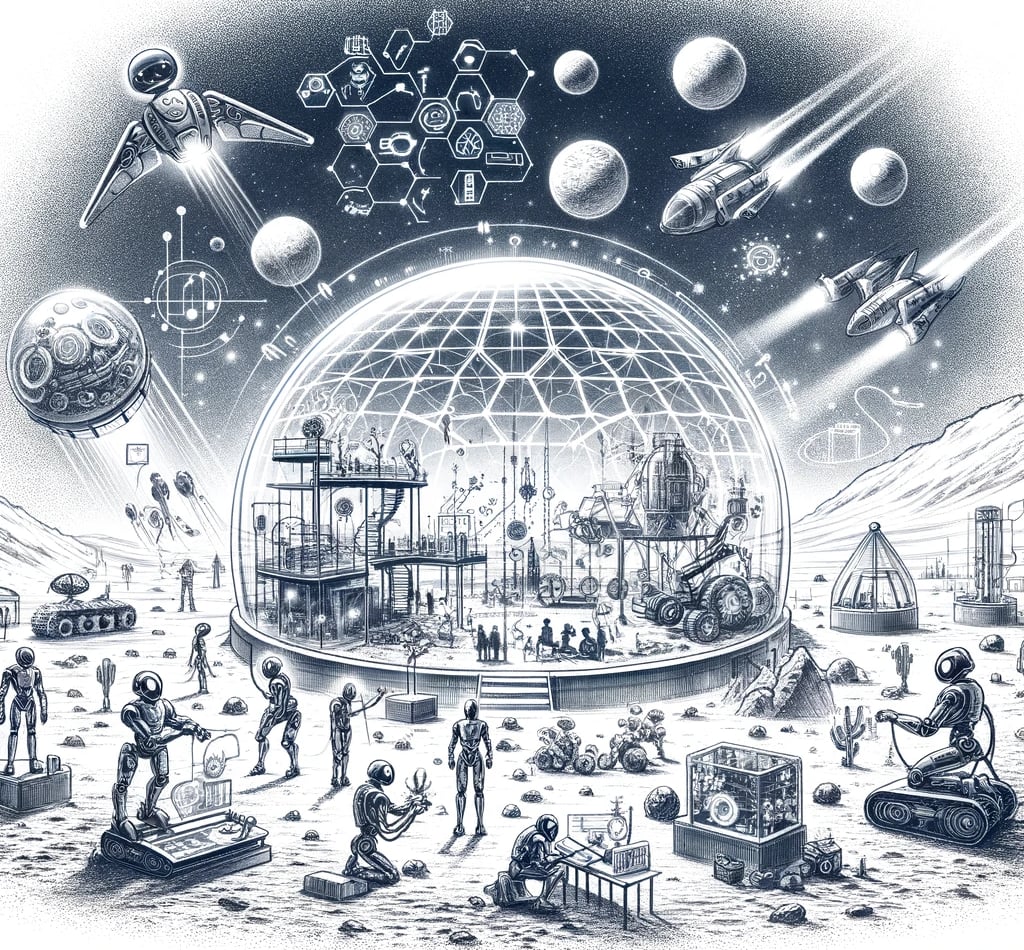Optimizing Time Management and Productivity for Future Space Colonization: A Scientific Perspective
EMERGING FUTURE
2/14/20243 min read


The prospect of space colonization, while still on the horizon, invites us to contemplate profound changes in the fabric of human life, including our approaches to time management and productivity. As we edge closer to establishing a presence on other planets, it becomes imperative to scrutinize how these monumental steps will influence our perception and utilization of time. This article delves into the challenges and opportunities presented by space colonization, with a focus on leveraging scientific and technological advancements to address time poverty and enhance productivity in extraterrestrial environments.
Technological Innovations and Their Impact on Time Efficiency in Space Colonies
The establishment of human colonies on other planets such as Mars will necessitate a reevaluation of our current technological capabilities, especially in automating tasks to ensure efficient time use. In microgravity environments or hostile planetary conditions, routine tasks may consume disproportionately more time than on Earth. As such, robotics, AI, and automation technologies will be critical in performing labor-intensive or time-consuming activities, from constructing habitats to conducting scientific research. The deployment of autonomous systems for resource extraction, habitat maintenance, and even health monitoring could significantly reduce the human time investment in survival-oriented tasks, redirecting focus towards innovation and exploration.
The Challenge of Synchronizing Time in Space Environments
One of the less discussed but equally significant challenges of space colonization is the synchronization of time across different planetary environments. The Martian day, for example, is slightly longer than an Earth day, posing questions on how to align work cycles, communication with Earth, and even the psychological impact of altered time perception on colonists. Research into circadian rhythms and the development of artificial environments that can mimic Earth's day-night cycle may be crucial in maintaining the health and productivity of space colonists. Furthermore, the establishment of a standardized time system for interplanetary communication and operations will be essential for coordinating activities across space colonies and Earth.
Advancing Time Banking in Space Colonies: A Model for Future Economies
The concept of time banking, where services are exchanged based on time rather than monetary value, presents an intriguing model for the economic systems of space colonies. Given the limited resources and potentially small initial populations of extraterrestrial settlements, a time-based economy could promote a culture of cooperation and communal support. This system could also ensure equitable access to services and resources, a crucial consideration in environments where traditional economic models may be impractical. However, the implementation of time banking in space colonies would require sophisticated tracking and exchange systems, possibly leveraging blockchain or other secure digital ledger technologies, to ensure transparency and trust among colonists.


Future of Technology Desk
Share:
Scientific Research and Technological Development: Paving the Way for Time-Affluent Societies Beyond Earth
The journey towards space colonization underscores the need for continued scientific research and technological development. Studies on human behavior and productivity in isolated and confined environments, such as those conducted on the International Space Station or in analog habitats on Earth, provide valuable insights into managing time effectively in space. Moreover, advancements in materials science, life support systems, and sustainable energy sources will play a pivotal role in reducing the time and resources required to establish and maintain extraterrestrial colonies.
Conclusion: Envisioning a Future of Time Affluence in Space
As humanity aspires to become an interplanetary species, the challenges of time management and productivity in space colonies prompt us to innovate and rethink our approaches to time. By harnessing technological advancements and adopting novel economic models like time banking, we can aim to create extraterrestrial societies where time poverty is a concept of the past. The scientific and technological groundwork laid today will be instrumental in ensuring that our future among the stars is not only technologically advanced but also rich in the most precious resource of all: time. This vision of time-affluent space societies encourages a multidisciplinary approach, combining insights from engineering, psychology, economics, and space science, to forge a future where human potential can flourish beyond the confines of Earth.
(With AI Input)
Who We Are:
The Economic Nations champions global unity through economic collaboration, focusing on sustainable growth, reducing inequalities, and enhancing global relationships for mutual prosperity and peace.


Contacts
enquiry@economicnations.org
(xx) 98-11-937-xxx (On verification)
